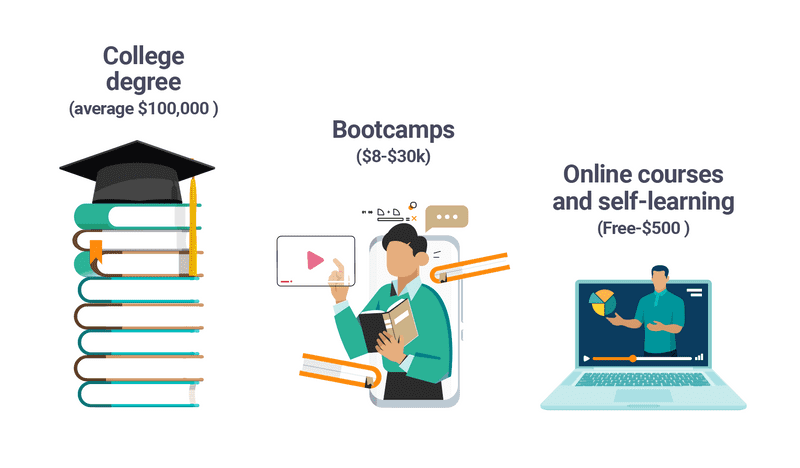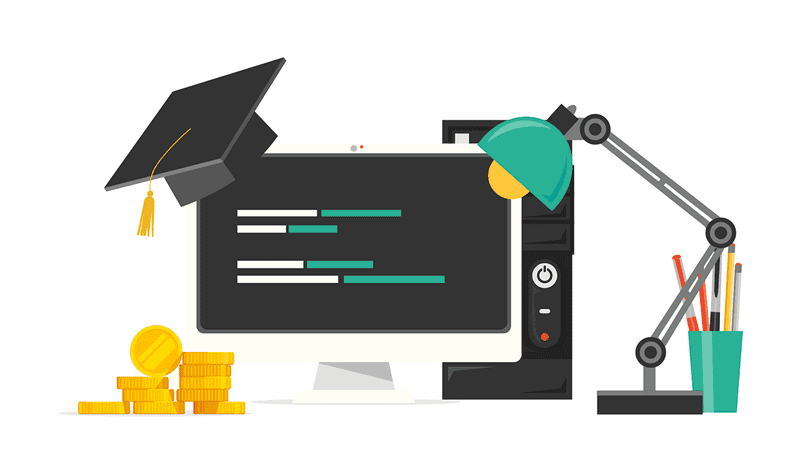There was a time when a college degree was the answer to everything. Today, that is no longer the case, especially in technological fields like software engineering. From Grace Hopper to Margaret Hamilton, some of the biggest names in software engineering have been self-taught.
There are a number of different ways to get into software development or related field without a bachelor’s degree or master’s degree. Online courses, bootcamps, internships, work experience, and mentorship programs can all get you a step closer to becoming a software engineer or software developer. In this article, we’ll examine the costs associated with each option.
As the job market becomes more competitive, students from all educational disciplines are vying for software engineering jobs. How much does it really cost to become a software engineer and how much do software engineers earn? Get the answers in this article.
Path 1: College degree
An average college degree will cost around $40,000 annually. This fee is higher at more in-demand universities, like MIT. But tuition isn’t the only kind of cost in a traditional college program.
- There are living expenses, transportation, and insurance costs that add to the fee. This means on average, it can cost $100,000 to become a software engineer through traditional software engineering degrees.
- An associate degree program lasts only two years, but it doesn’t get the same credibility as a bachelor’s degree program would.
- In fields like software engineering, a college education is somewhat behind in adapting to the latest advancements in the industry. This means that even after you complete your education, you’ll need to spend more money on updating your skillset for the current job market, which can include doing additional online courses to develop skills in certain programming languages, certain software programs, and job-ready skills such as project management, software design, and more.
- Following the completion of a formal education, many graduates are left to look for work on their own, without a support network or guidance. Many graduate students in the United States can spend a few months, if not years, applying for entry-level positions before starting their software engineering career.
Get To Know Other Software Engineering Students
Promise Morka
Software Engineer at AECOM
Dave McConeghy
Software Engineering Career Track Student at Springboard
Alyssa Menes
Software Engineer at Progyny
Path 2: Online courses and self-learning
Online courses offer significant flexibility and affordability that no other mode of learning currently offers. Free bootcamps and courses are available online in the form of MOOCs (Massive Open Online Courses) like the kind run by Coursera, Udemy, and Skillshare.
Coursera offers entire degrees, like the University of London’s Bachelor of Computer Science, which you can do part-time and complete in 3-6 years. It costs around $15,000 and can be completed entirely online. You can also do individual courses and specializations on Coursera for a subscription of $400-500 a year. Specialized courses on Udemy, Skillshare, and so on are available at subscriptions ranging from $10-50 a month.
This path typically offers a limited curriculum, little practical exposure, and no personal guidance. You will need to top up your learning with books and other online resources. Recommend books include Introduction to Algorithms from the MIT Press; Programming Pearls by John Bentley; and Clean Code: A Handbook of Agile Software Craftsmanship by Robert C Martin.
For more information on free online resources, check out Springboard’s own collection of free online resources.

Path 3: Online bootcamps
The perfect response to the limitations of a college degree is to become a software engineer through an online bootcamp. Online courses and bootcamps are relatively short, intensive programs that combine theoretical learning with hands-on experience, mentorship, and job support that, when combined, ensure career advancement and practical experience. Many bootcamps tend to be job-oriented and can range between four to 36 weeks depending on the depth of the program.
Depending on the duration of the bootcamp, a coding bootcamp can cost anywhere between $8,000-$30,000. Many bootcamps also offer income share agreements that charge a percentage of a learner’s income for 12-48 months in lieu of fees. If you’re considering an online bootcamp in software engineering, it’s important to understand the fee structures, promises, and guarantees made by bootcamp providers before taking the plunge.
For example:
- Springboard’s Software Engineering Career Track is a 36-week program, covering key aspects of front-end web development, back-end web development, databases, and data structures and algorithms.
- The total cost of the program is $12,100. You pay a $700 deposit and $950/month for 12 months after you start your job. Springboard also includes a job guarantee: if a graduate is unable to land a job after the course, their tuition may be refunded in full.
- In addition to learning resources, practice exercises, and hands-on projects, you’ll get a personal mentor who will work with you regularly to guide you towards course completion and beyond.
- Springboard’s bootcamp also includes career coaching to help you with your job search strategy, resume, interviews, and even salary negotiation.
- Finally, Springboard graduates earn an average of $89,000 (across all bootcamps), comfortably recouping their fee many times over within one year.
Springboard’s comprehensive bootcamp comparison guide lets you compare bootcamps from providers including Springboard, Thinkful, Flatiron School, Lambda School, and Fullstack Academy.
The bottom line? Becoming a software engineer today is easier than ever before. Learning different programming languages, software applications, software engineering programs, and software solutions can lead to a number of satisfying roles in the software engineering field. Software engineering jobs usually have high average salaries and software engineers usually enjoy high job satisfaction.
Since you’re here…
No one wakes up knowing how to code – they learn how to code. Tens of thousands of students have successfully learned with our courses, like our Software Engineering Bootcamp. If you’re a total newbie, our Software Engineering Career Track Prep Course will be a perfect fit. Let’s do this!






